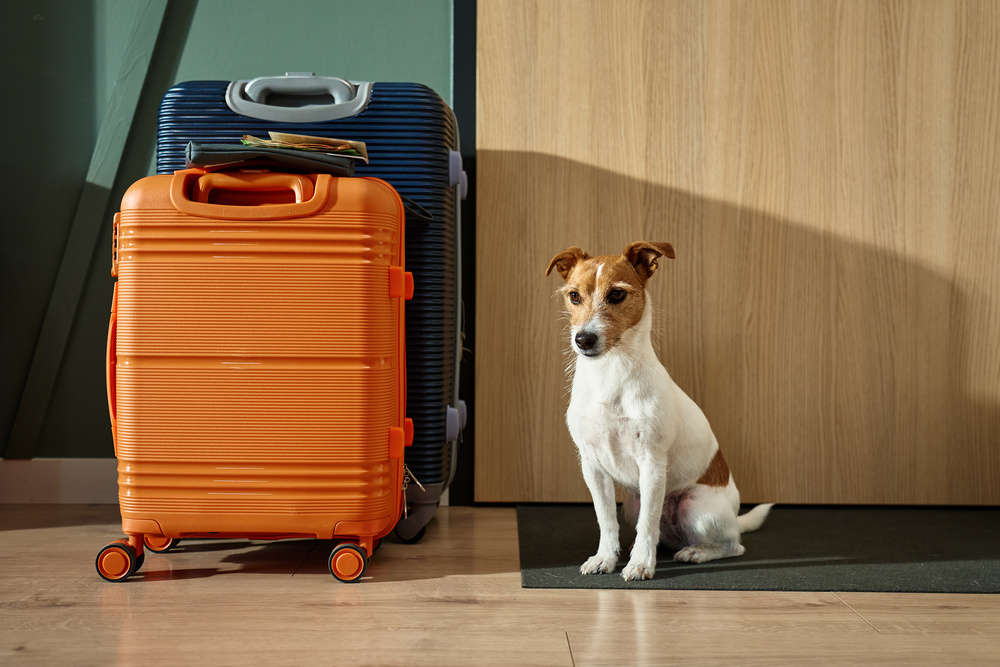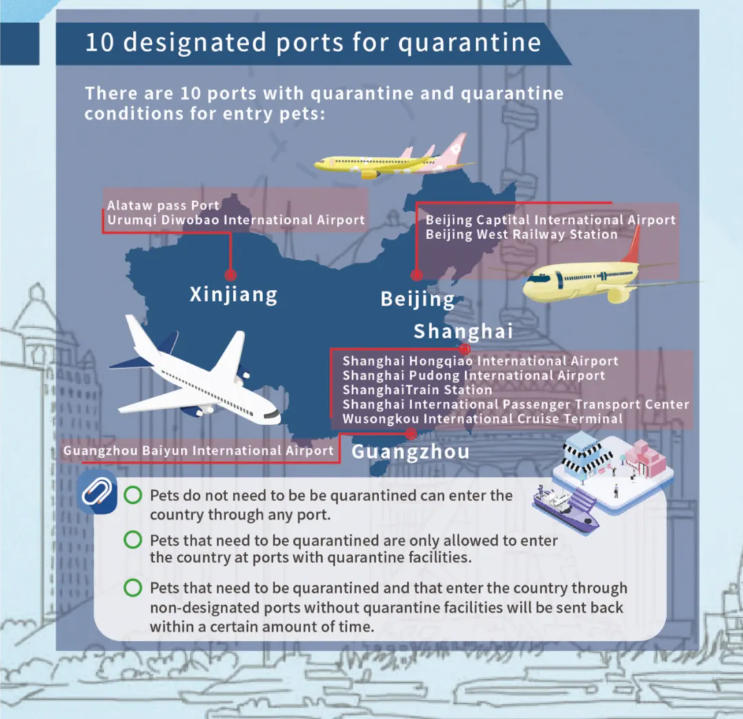How to bring a pet to Shanghai
If you plan to bring your furry friends to Shanghai, this guide will help you get them through the customs process smoothly.

What to prepare
China has varying policies for pets coming from different countries or regions. If you come from one of the following designated countries or regions:
New Zealand, Australia, Fiji, French Polynesia, Hawaii (the US), Guam (the US), Jamaica, Iceland, the United Kingdom, Ireland, Liechtenstein, Cyprus, Portugal, Sweden, Switzerland, Japan, Singapore, Hong Kong (China) and Macao (China)
you need to prepare:
1. Quarantine certificate:
- Pet information (including breed, scientific name, gender, color, date of birth or age);
- Serial number, date, and position of the implanted microchip;
- Result and date of animal health examination.
2. Certificate of rabies vaccination or immunization record.
3. Pet electronic microchip: The microchip must comply with international standards ISO11784 and ISO11785, otherwise you need to bring a reader that can read the implanted microchip.

If you are from one of the non-designated countries or regions, you need to prepare:
1. Quarantine certificate:
- Pet information (including date of birth or age);
- Serial number, date, and position of the implanted microchip;
- Rabies vaccination date and validity period, type of vaccine (inactivated vaccine or recombinant vaccine), vaccine brand, manufacturer's name;
- Date of rabies antibody titer test, name of testing institution, test result;
- Result and date of animal health examination.
2. Certificate of rabies vaccination (inactivated virus vaccine or recombinant/modified vaccine).
3. Rabies antibody test report issued by a laboratory recognized by China Customs. (The blood collection date for rabies antibody titer testing should not be earlier than the second rabies vaccination, the antibody titer or immune antibody level must be above 0.5 IU/ml, and the test result is valid within one year from the date of blood collection).
4. Pet electronic microchip: The microchip must comply with international standards ISO11784 and ISO11785, otherwise you need to bring a reader that can read the implanted microchip.
There are a total of 10 ports in China where your pets can be quarantined

Other things you may need to know:
1. If you bring guide dogs, hearing dogs, or search and rescue dogs with all the right documents, including quarantine certificates, vaccination proof, electronic chips, and professional training certificates, your furry friends can be exempt from quarantine after passing an on-site heath check.
2. Elderly, frail, pregnant, or lactating pets, or those with pre-existing conditions, may not be suitable for transportation or quarantine. You should consult a veterinarian to ensure their fitness for travel before bringing them to China.
The following are some of the frequently asked questions about bringing pets to China.

Q: Do I need to declare my pet to Customs upon arrival in Shanghai? What is the entry process?
A: Yes, you must declare your pet to Customs upon entry. The process is as follows: present the official animal health certificate from the country of origin, vaccination certificate, and a valid rabies antibody titer test report (if applicable). A Customs officer will verify these documents and scan your pet's microchip. If all requirements are met and the pet passes the on-site clinical inspection, it will be cleared for entry. If isolated quarantine is required, your pet will be transferred to a designated facility.
Q: The regulations state that the date of blood collection for the rabies antibody test cannot be earlier than the date of the second rabies vaccination. Does this mean my pet must receive two rabies vaccinations?
A: Not necessarily. A second vaccination is only required if your pet needs a new rabies antibody test. If you already have a valid rabies antibody test report, no further vaccinations are needed. The interval between two rabies vaccinations should follow the advice of your veterinarian.
Q: If my pet's vaccination record lacks a microchip number or its name was changed before the antibody test, is the test report still valid?
A: The report is valid provided the pet's name and microchip number on the rabies antibody test report match those on the official animal health certificate, and the microchip number implanted in the pet matches the one on all documents.
Q: When do the new regulations take effect? If I have all required documents ready by May 1, 2019, can my pet enter without quarantine?
A: The new regulations took effect on May 1, 2019. Pets entering on or after this date must meet the new requirements, including a clinical health examination performed within 14 days of arrival. Those meeting all conditions for exemption will be released without isolated quarantine.
Q: Can I use a rabies antibody test report issued before May 1, 2019?
A: Yes, test reports obtained before the new regulations took effect are acceptable.
Q: I am bringing my pet from Thailand, which has no labs approved by Chinese Customs. Are local lab reports accepted? Can I send serum to a lab in China or another country?
A: Rabies antibody test reports must be issued by one of the 62 laboratories in designated countries/regions recognized by China Customs. A list is available on the General Administration of Customs website. Serum cannot be sent to labs separately by individuals; the test must be conducted entirely by an accredited institution.
Q: Do I need to deworm my pet before entry? Are there time requirements?
A: Deworming is recommended. The timing should follow the specific medication's instructions or your veterinarian's guidance.
Q: Is microchipping mandatory? Does it have to be done before vaccination?
A: Yes, microchipping is mandatory for identification. While international best practice is to implant the microchip before or at the same time as the rabies vaccination, you should follow your veterinarian's advice. The key is that the chip number on all documents must match the number in your pet.
Q: Must the foreign animal health certificate include the microchip number and implantation date? Must the rabies antibody report include blood collection dates and lab names?
A: Yes. The official animal health certificate must include the microchip number and implantation date. If a rabies antibody test report is provided, the health certificate should also reference the blood collection date, testing institution's name, and the test results.
Q: Where can I find the Chinese names of Customs-approved labs?
A: The full list is available on the General Administration of Customs of China website (Homepage > Information Disclosure > Customs Regulations > Latest Announcement > Announcements No. 5 and No. 64 of 2019).
Q: I'm in Canada, and my vet says the rabies test takes 8 weeks, which is too long for my schedule. How can I bring my pet to China?
A: If you cannot provide a valid rabies antibody test report from a recognized lab, your pet will be subject to a 30-day isolated quarantine upon entry in China. Planning ahead for the test is essential to avoid quarantine.
Q: What documents do I need to bring my pet from Russia?
A: You will need: a microchip, an official animal health certificate from Russian authorities, a vaccination certificate, and a rabies antibody test report (with a titer >0.5 IU/ml) from a lab accepted by Chinese Customs.
Q: Can I bring my pet through cities other than Beijing, Shanghai, and Urumqi without a rabies antibody test?
A: Pets from designated countries/regions do not need a rabies titer test and can enter through any port with the correct health and vaccination certificates. Pets from non-designated countries require a rabies titer test and can only enter through ports with quarantine facilities. Bringing a pet requiring quarantine through a non-designated port may result in refusal of entry or destruction of the animal.
Q: I am in Australia, a rabies-free country. Do my pets need rabies vaccinations? Local vets don't stock the vaccine.
A: Australia is a designated country. Pets from Australia do not need a rabies vaccination or titer test. You only need the official Australian animal health certificate, a vaccination certificate (for other diseases), and a microchip. After passing the on-site clinical quarantine, your pet can enter from any port without isolation.
Q: If my pet hasn't had a rabies antibody test, is quarantine necessary upon arrival in Shanghai? How long would it last?
A: It depends on the country of origin. Pets from designated countries/regions with a valid health certificate and microchip do not need quarantine. Pets from non-designated countries without a valid rabies titer test will be subject to a 30-day quarantine in Shanghai.
Q: On what basis does Customs designate countries and regions? Will the list change?
A: Designations are based on the OIE's rabies-free status and Chinese quarantine laws. The list is subject to change and the latest version can be found on the General Administration of Customs website.
Q: My pet was vaccinated and had a rabies test in China before going to the US. Are these still recognized when we return?
A: Yes, provided the rabies vaccine and antibody test report are still within their validity period. The Changchun lab is an OIE reference lab and is recognized by China Customs.
Q: Must the owner's name be the same on all pet documents?
A: The owner's name does not need to be consistent across all documents. The primary identifier is the pet's microchip number, which must be consistent on the health certificate, vaccination record, and antibody test report.
Q: I am flying from the US to China with a layover in Hawaii. What procedures are required in the US?
A: Your pet must have an official animal health certificate and vaccination certificate issued by the US Department of Agriculture (USDA) in your state of origin, and must be microchipped. If the health certificate is issued by the authorities in Hawaii, it is considered from a designated region.
Q: Where is my pet after the plane lands? Is the process different from traveling without a pet?
A: You must confirm the location and retrieval process with your airline when you check in. Pets can travel in-cabin (if eligible), as checked baggage, or as air cargo. Pets arriving as baggage can be picked up at the oversized luggage area. Pets arriving as cargo must be cleared through a separate customs process for air cargo.
Q: Is the original rabies antibody test report required, or is a copy acceptable?
A: You must present the original report and a photocopy to Customs. The officer will examine both and will typically keep the copy, returning the original to you.
Q: Is there an English version of the new Customs regulations?
A: The General Administration of Customs Announcement No. 5 (2019) currently has no official English version. You will need to arrange for a translation yourself.
Q: Can I use the Animal Quarantine Certificate issued by Chinese Customs when I left China for my pet's return?
A: No. For re-entry, you must obtain a new animal health certificate from the country you are departing from.
Q: Can I bring a pet rabbit from Canada?
A: No. Only dogs and cats are permitted as personal pets. Other animals, including rabbits, are not allowed to be brought into China under these regulations.
Q: Is it acceptable if the rabies vaccine was administered before the microchip was implanted?
A: Yes, this is acceptable as long as the microchip number is correctly listed on the subsequent rabies antibody test report and matches the number in the pet.
Q: What does the on-site inspection entail for a pet from a non-designated country with complete documents?
A: The inspection includes verifying all documents (health certificate, vaccination record, rabies titer test) and scanning the microchip for a match. It also includes a clinical examination of the pet for signs of infectious or parasitic diseases.
Q: Is the "one person, one pet" rule strict? What if I have two pets?
A: The rule is strict. Each person is allowed to bring only one pet per entry. Pets exceeding this limit may be refused entry or returned to their point of origin.
Q: The rabies vaccine is valid for three years, but the antibody test report is only valid for one year. Is the report still valid the following year?
A: The antibody test report is valid for one year from the date of blood sampling. If your pet receives a new rabies vaccination within the validity period of the previous one, the existing test report remains valid.
Q: Are there specific timing requirements for the rabies vaccination before entry?
A: There is no fixed rule like "one month to one year." The vaccination should be administered according to scientific immunization protocols under the direction of a licensed veterinarian, following the vaccine manufacturer's guidelines.
Q: Are there breed restrictions for inbound pets? I have a Bengal cat.
A: Only legally owned domestic dogs and cats are permitted. For hybrid animals like Bengal cats, which may be listed under CITES (the Convention on International Trade in Endangered Species), additional CITES permits may be required. To simplify the process, it is recommended that the official animal health certificate identifies the animal as a "domestic cat."
Q: How long does customs clearance for a pet typically take? I have a connecting flight in Chengdu; do I need a domestic quarantine certificate?
A: Clearance time varies based on document accuracy, chip readability, and passenger volume, but typically takes a similar amount of time as clearing regular luggage. Once your pet has cleared customs at its port of entry and is formally in China, you may need a separate "quarantine certificate for inter-provincial movement" for your domestic flight. This is issued by local Chinese animal health authorities, not Customs, and you should contact them directly.
Q: Are the entry requirements for an emotional support dog the same as for a regular pet dog?
A: Yes. Emotional support animals are not granted the same exemptions as officially trained service dogs (e.g., guide dogs). They must meet all the standard entry requirements for pet dogs.
Updated Oct 16, 2025
Sources: Shanghai Customs, Pudong Airport Customs, Huangpu Customs


